James Rozoff's Blog, page 6
October 20, 2019
An Excerpt From Seven Stones Book Three: Stolen Soul
Stolen Soul
A Magic Show In 1923 Germany
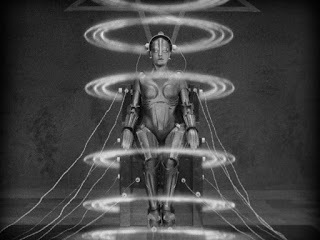
A large box sat upon the dais, front doors opened to show it empty. Doug closed the doors and began placing items into the box from an open door in the top. Springs, cogs, vacuum tubes, all the building blocks of the dawning civilization. They clanked as they dropped into the box. When he was done, he closed the top of the box, stepped down from the dais, and approached a board of dials, gauges, and levers. He pulled a lever and the electrical pylons on either side of the box sprang once more to life, snapping their energy menacingly. The stage, the entire theater, pulsated in the flashing light, so that the audience could both see and feel what was going on. The result was an audience that felt both threatened and helpless. They were mere spectators of an event that could at any moment overwhelm them.
The lightning throbbed and arced, each pylon reaching out to the other. They met at the box in the middle, the one that contained the cogs and tubes. The very air seemed to fry as it carried along the electrical charge. Behind the box, vast cogs began to spin, unstoppable wheels of industry coming to life, energized by the pylons.
Something immense was being born. Something beyond the comprehension let alone control of mere humans. The man who had pulled the lever, who was now busily adjusting dials and gazing at gauges, was in the grip of the energy as much as any of the cogs. Strobing blue light revealed him lost in ecstasy. He was part of something larger, and it did not matter that it had taken control of him. His posture, his movements, the manic look on his face made it appear as though he was no longer a man at all but a part of the machine.
And just when the noise of machinery and crackling electricity had reached its crescendo, it accelerated. This was no show for humans, it was a spectacle they were forced to participate in. They were witnesses to the dawn of a world that was indifferent and hostile to them. Their only choices were to surrender or perish.
In the midst of the madness, a sudden final climaxing throb arose. Then suddenly there was silence and darkness. The effect was even more shocking than the chaos it followed. It left the audience without anything to hold onto, as if they had been carried up into the sky and then left to fall. But the figure at the control board flipped a switch, and two lights cast their illumination upon him and the box upon the dais.
After a moment, the small sound of an opening door could be heard. The front of the box was opening, slowly, almost painfully. The hinges of the front doors seemed to shriek in pain as they gave way, as if the lightning had fused the metal. The audience peered inside the box in anticipation, waiting in fear for what would emerge from the shadows within the box. Amid the darkness inside, sharp light glinted on something shiny and silver. As it emerged it became obvious that it was a woman and yet not so. She was beautiful and bright, and yet she was not human. She was a machine, and yet something more. She was a goddess. Untouchable. Inhuman.
Upon her was an air of imperiousness. The man who had created her was enthralled with what he saw. Here was a thing of beauty to be worshipped, though it was the work of his own hands.
It could not be denied she was beautiful, despite her unworldliness. She was austere and pure, unblemished by the world, not of it. Untouched by mortality or imperfection. She was everything humanity had attained to, and yet she was not human. She was physically ideal, and yet within her gaze and within her movement, one could see that she had no soul.
Her movements were slow and stiff, but majestic. Upon her diaphanous clothing, light shown like the aftereffects of the electricity that had given her life. And all the while the man at the control board look on, transfixed.
She made her way slowly towards him, and as she neared he fell to his knees in obeisance, in worship. He bowed his head to the floor in front of her. And yet, though he did not cast his eyes upon her, he rose when she commanded him to do so with a wave of her inhuman hand. He got to his feet, head still bowed, and followed her as she walked slowly towards the box. They both entered, then the doors shut of their own accord. Once more, the machinery sprang to life, no longer requiring a human operator. Once more, lightning flashed, puffs of smoke arising from the pylons. A smell of burnt flesh, sulfur, and oil hung in the air. And when at last the machinery was silenced, when the lights died to a single circle focused on the box upon the dais, the doors slowly opened to reveal nothing but darkness.
Published on October 20, 2019 17:55
October 6, 2019
Conspiracy Theories: True, False, And Perhaps
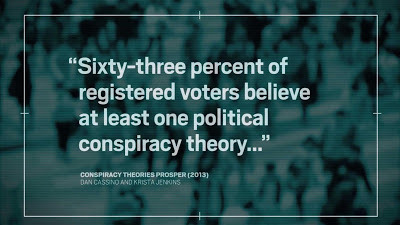
There are two equally dangerous reactions to conspiracy theories: 1. Ceasing to even consider the arguments behind an idea the moment the conspiracy label is applied and 2. the tendency to believe all of them are likely true once the evidence for one becomes overwhelming. A conspiracy theory is, after all, merely a theory that two or more people conspired for a purpose. People do that all the time. To call something a conspiracy theory should not carry with it negative connotations.
It comes down to which type of conspiracy you are first introduced to, I suppose. If you are first introduced to a conspiracy theory that, after probing deeply, either is proven false or seems to be false, you will afterwards tend to dismiss whatever conspiracy you come across. You will have been inoculated.
Similarly, if you are introduced to a conspiracy theory that seems to hold true after extended investigation, you will be tempted to believe whatever conspiracy theory that is floated about must have some validity. You will have become infected.
The appeal of both is to our intellectual laziness. It is being exacerbated by the information overload that is unavoidable in this age. We are overwhelmed by both theories and propaganda from official sources, and we are left to ourselves to decide which side we tend to believe. And with the endless amount of leads to follow, it is not only convenient but necessary to dismiss facts in bulk, to cling to a mindset, opinion, or group of authorities in order to avoid ambiguity and the pain of not knowing. The answer to this problem is in letting go of a need to have a definite opinion. Between yes and no, we can add the option of “I don’t know.” Egoically, this is an unsatisfactory answer. But ego has never been our friend.
Just think of what a boon to our society it would be for people to say “I don’t know” when engaging in an argument. True, too often “I don’t know” has been followed up with “and I don’t care”. This is a third form of intellectual laziness, I suppose. But more often failing to engage in debate stems not from disinterest so much as the idea that a debate must have a winner. That’s where “I don’t know” comes in handy. “I don’t know” is you admitting you don’t have the answers, and therefore don’t feel the need to win an argument.
People often say they don’t like social media because of all the arguments. That is precisely why I enjoy social media, so that I might argue with others, many of whom I do not know. It really is an unprecedented tool for communication and education. And despite the missteps many have taken in figuring out the unwritten rules of online communication, I truly believe humans are working their way towards understanding how communication with family/friends/strangers can work. We merely have to let go of rigid opinions in order to allow more facts to help us form a more sophisticated view of things.
In short, we should not hold rigid opinions so much as theories. Theories can be modified whenever new knowledge is introduced, whereas rigid opinions necessitate the molding of new knowledge to conform to biases. The braver course is always in laying out the information you possess and offering it to others. The smarter course is in listening to valid criticism and defending your position when it is legitimate, admitting flaws and incorporating new information when it is not. Not only will you convert more people to your position with this approach, you will make those around you more accepting of spirited debate. And I'm firmly convinced the world will be made better by the collective mind than by a few know-it-alls.
P.S. I'm pretty sure JFK was not killed by Oswald, Russian election interference is a laughable argument, and reptile aliens are NOT running our planet. I'd be pleased to have a friendly argument on the first two, not so much on the third.
Published on October 06, 2019 18:30
September 26, 2019
Random Thoughts Part 27
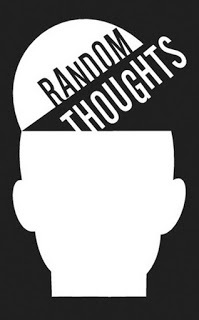
Time and again they brag about how shiny their machine is and how fast it goes. But never do they bother to answer when you ask them where it’s going.
The difference between driving your car up a curb in order to run over a bunny rabbit and flying to Africa to shoot an animal is merely the degree of commitment required.
As insightful as The Matrix is, they got it wrong. It is the illusion that is always the painful place to live in, though it can appear to provide comfort or at least refuge. It is ALWAYS better to know the truth, because when you know the truth, the subtle lie does not weigh on your conscience, poisoning the sweetest joys that are available to even the poorest and most set-upon of us.
Here is the paradox of life: if you want to stay young, you have to keep taking chances, but if you want to grow old, you will have to stop.
You really can’t blame people for making bad choices until you make sure they have good ones available.
When most non-Christians reject Christianity they concentrate on the mystical aspects while ignoring the revolutionary teachings of Christ. When most Christians embrace Christianity, they too concentrate on the mystical aspect while ignoring the revolutionary teachings of Christ. Both sides give lip service to such notions of non-violence, forgiveness of others, loving others as oneself, and a desire for peace. But somehow the message that Christ delivered not only in word but in example seems to be the elephant in the room.
Is it weird that I should be nostalgic for a past that was spent dreaming of the future?
As I grow older I come to regard all that is natural as miraculous and all that is manmade as suspect if not outright corrupting. Awe is to be found in nature, distraction is all one can find in the world made by humans. I despise the use of the word “awesome” being applied to anything created by humans with the exceptions of Notre Dame Cathedral and Anglagard’s first album.
Truth without power is a dangerous possession.
You ever get the feeling humans have fallen a little too in love with their technology? It is not too different from the story of Narcissus falling in love with his own reflection.
I sometimes get the feeling that the 17th Century will eventually wake up and realize human flight and the internet were just a crazy dream brought on by something they had eaten. After all what a silly notion it is to believe that at this moment there are people sitting comfortably in the middle of the sky accessing information instantaneously from all over the world. Wondrous stuff for a fantasy novel, though.
We all want to shape the world in our own image, and we all envision a world where people such as ourselves sit a bit above others and are revered.
I’d rather be the quiet than the noise.
Science not in the service of nature is an abomination.
Man: A creature strong enough to destroy the earth, but not strong enough to save it.
It is best to treat everyone you know as an equal, because everyone you look up to will eventually disappoint you, and everyone you look down on will sooner or later humble you.
Numbers don’t lie and guns don’t kill, but put numbers in the hands of a liar or a gun in the hands of a killer, and you have a bad situation on your hands.
Sure, they call it a restroom, but you try taking a nap on the floor in one at a Barnes And Noble and people get all weird about it.
Published on September 26, 2019 19:15
August 30, 2019
The Ocean Of Sorrow, The Ocean Of Fear
There is an ocean of sorrow. Its surface is calm, its water clear, and in it we can see depths we can never hope to reach.There is an ocean of fear. Its waters are ever-turbulent, so that we can only imagine what dangers lie within its depths.Between the two runs the thinnest of islands, barely existing amidst the endless stretches of water. But on this island, there is neither sorrow nor fear. It is an island upon which we can find perfect contentedness.The ocean of sadness is the past. Should we attempt to do more than wade in it, we will be sucked down by our memories and drown in our regrets and our loss.The ocean of fear is the future. It holds within it not only imagined horrors, but also our inevitable death and the wreck of all that now is. We may believe we can navigate it by the stars, but once we lose sight of the island, we will soon lose our bearings as fearful waves crash down upon us.The island that separates the two is the now. On it, we are free from sorrow and fear. On it, we can find peace without cessation.
Published on August 30, 2019 18:00
July 21, 2019
Live Sanely, Live Simply
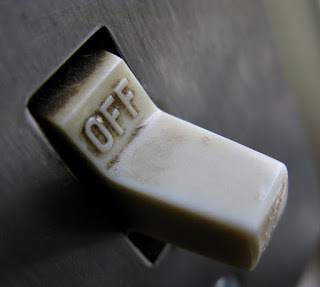
Reality occasionally cuts through the artificial world we’ve created for ourselves. It is at such moments we realize how distant the two have grown from each other.
It happened to me today at work when a coworker noticed I was being bothered by the fan blowing at me and stated that it really wasn’t warm enough to have a fan on. He then said he could point it in a different direction if I wanted.
That’s it. That’s the moment. I realized that people no longer consider turning things off as an option. That would have been the logical choice for anyone from a past generation. That is the correct action that was drilled into my skull by my parents as a child. If you're not using it, turn it off. If you’re not watching the television, turn it off. If you’re not in a room, turn the light off.
Sounds like nagging, doesn’t it? What it actually is is common sense. Your parents nagged you for a reason, because you had a lot to learn. They nagged you because they knew there was an electric bill to pay every month and there were real consequences for wasting energy.
More than that, though, they grew up in a different reality, one where thrift was not only wise, it was necessary. You did not waste because the alternative might just be hunger or abject poverty. For many of our ancestors, it was a matter of life and death.
We no longer have real connection to the world in which we live. Out of sight and out of mind is the supply side for the electricity. We do not see the power plant where the electricity is created. We are not aware of the excess heat created along with the energy that contributes to a warming planet. We do not see the mountains of coal that have been shipped from out of state, mined by people who work horrible jobs and destroy their health in the process. We do not see the ravaged landscapes that are the result of coal mining. We never think about the many people involved in bringing electricity to our homes and places of business: the linemen, the loaders of ships and the crew of such vessels. So given our blindness to our reality, why would we ever think to turn something off, especially at work where someone else is paying for it?
I caught myself in my own little bubble recently. I was about to pour myself a glass of water but had just done the dishes and didn’t want to dirty another glass. So I thought about just having a can of Pepsi. And then it hit me: I would save myself the energy of washing a dish by having others mine aluminum, ship it somewhere to be fashioned into a can, fill it with ingredients from God knows where, and then take it by semi to my local grocery store, where I would waste gasoline extracted from Saudi Arabia, shipped to Texas where it was refined, and then brought north to Wisconsin where an attendant is paid money to take mine. But it really was simpler on my end to have a Pepsi.
The problem is that we are all interconnected in ways we don’t ever stop to think about. In fact, we have become so interconnected that it is impossible to comprehend. Truth be known, we would not have a cell phone or the clothes we wear without people—often children—being exploited in order to provide us with cheap goods we don’t really need. Nobody, given a direct choice, would choose to have children mining precious metals for subsistence wages. But, you see, it’s just so darn…convenient. And the underlying principle of convenience is that we don’t want to think too much about it. So much easier to go with the flow.
The problem with going with the flow and with convenience is that in the long term they lead us to a bad end. Nobody got anywhere worth going by taking the convenient route. There’s a price that isn’t being paid and a reality not being dealt with, and eventually it will come back to bite us.
It is time—way past time—for us to begin reconnecting to our world and our fellow humans in simple and concrete ways, of trimming out the complexity that leads to alienation. To do this we have to swap out the concept of convenience for simplicity, replace quantity of goods for quality of experience.

We don’t need more possessions, larger televisions, or faster internet service. Anyone complaining they don’t have enough of those things in 21st Century America is sick in the head. In truth, we are a society that has been suffering for quite some time now with the disease of consumption. We have made as our heroes those who do much, create much, have much. The people we need to start holding up as role models are those who take little, both from others and from nature. Those who find contentment in the simple joys that are afforded to the many instead of those that can only ever be afforded by the few.
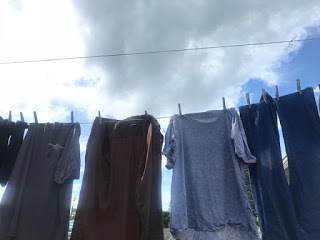
This is not only necessary, it will feel good. Once the sickness has passed, we will realize just what a fever-induced delirium we have been living. Once we have freed ourselves from our insulated bubbles, we will feel how healthy it is to be connected to the world in real and meaningful ways. We will once again know how it feels to walk barefoot through the grass with the sun on our skin. We’ll realize that sun-dried sheets smell infinitely better than a dryer sheet. We’ll once again eat real food, live in the seasons, wear clothes made by willing workers rather than children under threat of starvation.
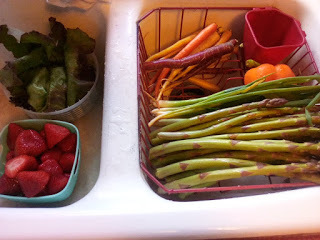 This is going to be good.
This is going to be good.
Published on July 21, 2019 13:55
July 5, 2019
Meditations On A Poem By Caitlin Johnstone
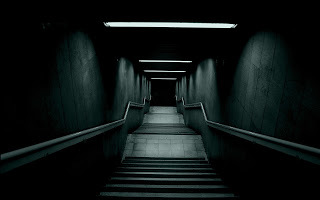
If you have not yet read it, I highly suggest this wonderful poem by Caitlin Johnstone. Her book Woke is never too far from my side and I often reread it and meditate upon it. I was recently doing so and would like to add to what she said in my own non-poetic way.
Have the courage to speak, yes, but also have the courage to feel. Because the bastards not only want to shut you up, they want to shut you down. Sadists are like that. They not only want to control your behavior, they want to control your very thoughts and emotions. They do not permit you your own feelings. Your feelings are an assault upon their mastery. They will seek to convince you your very feelings betray what a worthless person you are. Feel!
And you are tempted to shut down your feelings, aren’t you? You see the horrible things the bastards are doing--the killing of innocents, the perversion of childhood, the destruction of forests, the defaming of truth-tellers--and it all becomes too much to deal with, so you look away, pretend it isn’t happening and distract yourself with lesser things. You create you only little niche where you feel you can have some impact, and in so doing abandon the idea of being powerful on the more important issues. You create for yourself a smaller--tiny--world, because when you open up your feelings all you get is pain.
But don’t stop feeling. Take it all in, every bit of it. Accept what your eyes see, what your ears hear and what your heart knows. It is not your feelings and senses that are betraying you but the sadists who see you as another commodity on the shelf which they can buy and then dispose of when you become useless. Feel more intensely, and you will feel the power surge back into your weary and faded essence. Feel more fully and you will once again be flooded with your own power, and it will rinse away the fear and self-loathing that has dominated your life for too long. Feel and you will have the power of righteous indignation Dr. King spoke of. Feel because that’s what it means to be alive. And you are ever so gloriously alive. Feel because if you don’t you are already dead. Feel, because if you are already dead you have nothing more to fear from the sadists.
Feel because only in feeling do you realize your power. Only in being fearlessly yourself can you counteract those who wish to possess you in a material as well as a mental and spiritual manner. To feel is to be in touch with that miracle of life that flows through you every second you are on Earth. And this alone is the answer to oppression. This is the spiritual response to the materialist’s preference for possessions over human beings, domination over love. To be open to what you are feeling and thinking is the answer to conformity and authoritarianism. If you allow yourself to feel, you will finally realize you are not a thing which can be owned but an individual who needs not bow to anyone.
To be open to that which flows in you is to take the greatest of pleasures in the simplest of experiences: the smell of a flower, the touch of a cool breeze, the sound of waves lapping on the shore. In being open to that flow you realize all the temptations of the sadists are perverted and ugly distractions. In being open to the life within you, you understand that there is nothing they can threaten you with that is more fearful than closing yourself off to yourself. The only real hell is submission to their dominance. In realizing you are not a thing but life itself, you will no long require their baubles and their cheap toys they sell as the keys to happiness, no longer fear what their wrath.
Live, and do not resign yourself to a life within the shadows. Live and abandon the cages they wish to keep you in. The only real means of resisting is by rejecting. They cannot define you.
It means nothing to speak without fear, it means everything to feel and look without fear. The timid soul can speak fearlessly because, never daring to look at things as they are, never allowing themselves to feel genuine emotion, they will never utter a disquieting thought.
Nietzsche’s expression “When you stare into the abyss, the abyss stares back” sounds as if it comes from one who has been to the edge and come back to tell the tale. It sounds like the statement of a great explorer who has come to the end of human ability to explore reality. In truth they are the words of a coward who peered into the depths, saw things that frightened him, and ran away. Look, look into the abyss without worrying about what stares back. Do not fear the utter darkness for it is your mission to bring light to it. When the abyss stares back be so unafraid and open that your brightness causes it to avert its gaze. You are light. You are life.
Once you have gazed upon the abyss and driven away the monsters of your own creation that lurk there, you will have no need to worry about what it is you should say. The words will burst from you. They will burst from life itself, because that is what you are.
Published on July 05, 2019 09:35
June 13, 2019
Atman: An Attempt At Poetry
AtmanI saw a plastic water bottle
Bobbing on the waves
Of a poisoned lakeWe cannot drink from the river
But it’s okay
There’s a bottle for you
And a bottle for me
Just none for the fish.It’s the best way
It’s the only way
It is God’s way.
It’s the Market’s way.We cannot share
That is wrong,
That makes us lazy
That makes us unfreeWe must work for ourselves
So we can buy a plastic bottle
For our own private use
Or the poison will get us.We are all bottles of water
Bobbing on the sea
Afraid to spill ourselves into the whole
Separated by a plastic barrier from the all
Our lids snuggly tight
Killing the planet
To save ourselves
Bobbing on the waves
Of a poisoned lakeWe cannot drink from the river
But it’s okay
There’s a bottle for you
And a bottle for me
Just none for the fish.It’s the best way
It’s the only way
It is God’s way.
It’s the Market’s way.We cannot share
That is wrong,
That makes us lazy
That makes us unfreeWe must work for ourselves
So we can buy a plastic bottle
For our own private use
Or the poison will get us.We are all bottles of water
Bobbing on the sea
Afraid to spill ourselves into the whole
Separated by a plastic barrier from the all
Our lids snuggly tight
Killing the planet
To save ourselves
Published on June 13, 2019 18:25
June 9, 2019
The Clipper City Co-Op

Above is a picture I took a couple months ago. Back then, it was hard to imagine being where we are now, basking in the warmth of summer weather.
Two months ago, the first fruits and vegetables of summer seemed so very far away. And yet now my sink is full of the food we've acquired through our CSA and the local farmers' market.
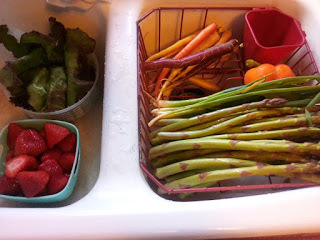 You see, while I was feeling stranded in a seemingly never-ending winter, others were getting ready for the growing season. While others prepared the soil, planted the seeds, and did all of the hard work required to bring a bounty to my table, all that was required of me was a little faith and patience. Now I am enjoying the results of their planning and efforts. It's a pretty good deal for someone who knows next to nothing about growing food.
You see, while I was feeling stranded in a seemingly never-ending winter, others were getting ready for the growing season. While others prepared the soil, planted the seeds, and did all of the hard work required to bring a bounty to my table, all that was required of me was a little faith and patience. Now I am enjoying the results of their planning and efforts. It's a pretty good deal for someone who knows next to nothing about growing food.But I have planted a little seed of my own. If you look once more at the picture of my front yard buried in piles of snow, you can catch a glimpse of it. It is my yard sign for the Clipper City Co-Op. It symbolizes my commitment to community and to a better way of bringing food to our families, a way to help sustain local agriculture.

Oh, I know, the Clipper City Co-Op is not yet a physical grocery store. But the first signs of its growth are apparent in the many signs you see in people's front yards. While others sit in their houses, not capable of imagining anything other than the current season, those who see the need are preparing for the season to come. Even those who are not involved in the work of bringing it to fruition can contribute through a small token of faith. Become a member, the season of the Clipper City Co-Op will be upon us before we know it. Happy Eating.
Published on June 09, 2019 12:01
May 19, 2019
Farewell, Hartman's
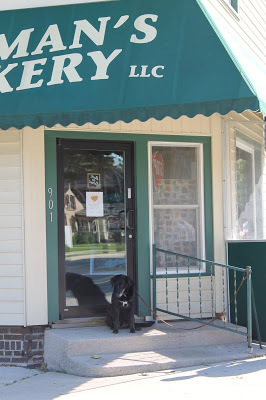 Bella, hoping for a cookie.
Bella, hoping for a cookie.There is something sacred about a bakery. That may seem like an absurd statement to you, but you would think differently if you had the smell of freshly baking bread about you. For the last 20 years I have had that privilege, as Hartman’s bakery has sanctified my neighborhood with it’s intoxicating aroma the way a church is filled with frankincense.
There is no better neighbor than a baker. There is no business you would rather have in your neighborhood than a bakery, except perhaps a café or bookstore (fortunately, we have both within blocks of our house). I have lived a block away from Hartman’s for decades now and I only have to step out of my house and breath deeply to be reminded that we are blessed by its presence. There is no bottled perfume at any cost that can be as alluring.
When I was young, we would go to visit my grandmother, who also had a bakery right around the corner from her house. It was one of my fonder memories of visiting her, being sent to buy a loaf of bread and given enough money to buy myself a cream puff, as well. Bread had always been nothing more than bread to me, until I had toast at my grandma’s. The bread was not the type I was used to, did not fit perfectly in the toaster, so that some parts were burnt while other parts still white. But there was a taste to it that could not be compared, especially when paired with boysenberry jam canned by an aunt or friend of the family. The most enduring memories are those that are related to a smell, and to this day I can still vividly recall the smell of fresh bread toasting in my Grandmother’s kitchen.
Moving into a house that had a bakery so close brought back vivid and pleasant memories of youth. More than that, it created many new moments, for my wife, myself and our son. I remember our son being an early riser, and we could buy a few extra moments of sleep by giving him a small amount of change to purchase something from Hartman’s. He always seemed to return with more than he had money for, and I half-suspect someone there had taken pity on the boy whose appetite was greater than the sum of his quarters.
My dog, too, was a fan of Hartman’s bakery. For years we would walk by it on an almost daily basis, and often I’d stop for a dog cookie or two (all right, I might have gotten a cream-filled Long John to go with it). I’d put her cookies in a white bag and hand it to her, and she would carry it home in her mouth as daintily as Jackie Onassis with a hand bag. One of my great pleasures was seeing drivers-by stare at my dog as we walked home. Dogs, too, would stare, sticking their heads out of the car windows as if in envy.
My dog would want to stop at the bakery every time we passed by it, and often times when it was closed I would have to drag her away. On one occasion, the owner was outside and noticed my dog’s intent. He told us to wait where we were, and in a moment returned from inside with a handful of cookies for my very grateful dog. And—I think it’s okay to say this now—on several occasions, he permitted my Bella into the bakery itself in order to have a look around.
I can tell you everybody’s favorites. My wife likes the peanut squares, my son likes the frosted cookies, and I like the cream-filled Long Johns. Or the cream-filled chocolate cupcakes. Or the seven-layer squares. My mom’s favorites were the apple fritters and the glazed croissants. I can’t recall how many times I stopped at the bakery to grab donuts on my way to my mom’s house. I always brought extra because my mom loved to share. It was a real treat for her neighbors on the south side of town.
I like to walk, and in the 20 years I lived in the neighborhood, I’ve easily walked past the bakery thousands of times. I have seen countless people go in to Hartman’s and come out with arms full. I have bought donuts to bring to work for my birthday, seen parents buying cakes for their children’s. I have seen the happy faces of those who walked up to the door, and have witnessed their secret suffering when they saw the Closed sign on the door and had to turn away empty-handed. I have seen the misfortune of a child who dropped his cookie on the sidewalk and the good fortune of my dog who was not at all shy about eating off the ground.
There are certain things that make a community unique, and for many years Hartman’s was one of them. Hartman’s is closing, and it makes me very sad, but I understand that nothing lasts for ever and I wish all the best to those who have given so much to the neighborhood for so long. You have touched many people in positive ways, and the smell of baking donuts will linger forever in my memory. Thank you.
Published on May 19, 2019 13:53
April 28, 2019
The Beggar Who Blessed Me

I was recently in Columbia, spending time visiting loved ones and seeing the sights. When travelling somewhere for the first time, especially for someone who doesn’t have the opportunity to travel much, figuring out how much cash to bring and how much to convert to local currency can be a guessing game that doesn’t go very well.
So after a couple of days bumming around I was out of pesos. Which, added to the fact that my credit card wasn’t working, left me in a rather foul mood. It wasn’t because of a compulsion to shop and consume, but because I felt a bit of a drag on those in my company because I didn’t feel like I was contributing my part. Worse than that, I wasn’t able to give a pittance to help the local economy. In Columbia there are a lot of street performers and vendors who aren’t shy about looking to do business. On two separate occasions I had street rappers decide to do their rap in front of me. It would have been convenient to throw them a few thousand pesos and have them move on to the next sap. More importantly, it would have made me feel good to support those vendors who are out there all day hustling to earn an existence. Buying an arepa from a local for the price of a U.S. dollar would have been a mutually beneficial exchange. But there was an even greater reason I was feeling bad about not having cash on hand.
Coming from a small city in the United States, I am not used to witnessing homelessness and poverty so close up. There was a fair amount of that on display in the areas of Columbia I visited. And while I’m past the age of believing I am morally obliged to fix every bit of suffering, I am also past the age where I'm comfortable turning away and pretending I don’t see it. But having no cash on hand, I had no other choice. It made me feel bad.
The first time you turn away from the misfortune of others is hard, but it becomes increasingly easier thereafter. It is a habit that forms quickly, and pretty soon you are able to walk past those people in need as if they don’t really exist.
There are plenty of good explanations and rationalizations for doing so. “They’re just playing upon your sympathies.” “They’re not really that bad off, they’ve just found an easy way to make a buck.” “If you give to one, the others will take you for an easy mark.” “You’re not really helping them, you’re just contributing to their problems.” And there are plenty of people who are eager to share these explanations with you, those who have experienced the same discomfort and found easy explanations in order to relieve themselves of this discomfort. People you trust, people you like, friends, family. But it’s just a way of avoiding real problems in order to live in a more comforting, imaginary world. I’ve come to realize this is not a good way to go through life, that reality can only be walled off for so long.
Fortunately, my wife woke up early one morning and managed to find an ATM, allowing me to carry some pesos along with me. The first thing I did was to give a meager amount to a man sleeping in a doorway across the street from our Airbnb. I thought at first that he was one who had so tugged at my heartstrings the night before when he pled with me for a little something and I had nothing to give, but it turned out to be someone else. There is no shortage of the truly needy. Nonetheless, I gave this man a few dollars and he gave me a “God bless you” in return. It was a greater blessing to me than any that could have been given by any spiritual or religious leader, and I have no doubt as to who got the better of that transaction. I was not expecting that. I was expecting a strictly financial transaction, but found myself dealing with a real human being capable of touching me as I did him.
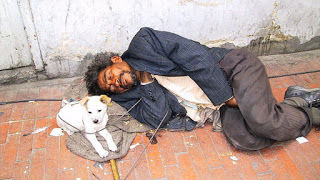
It wasn’t much, and I certainly was no one’s savior, but I was now able to give a few coins to the indigent I met in the streets, was now able to see them as human beings, part of the same community and world I inhabited. The pull to resist such an attitude was strong both from myself and others, as if I was threatening to pull apart the very fabric of reality. And in a way, it was. It was the smallest participation in the message that Jesus delivered two millennia ago, it was the faith of a mustard seed which moved our perception of the world undiscernibly but undeniably. The mountain hadn’t moved much, but it had shifted, at least within my understanding. It’s an understanding that is threatening to the accepted way of viewing the world.
Cast your bread upon the water and you will anger those you call family and friends. Embrace ever so slightly the vision that our hope for security rests not in what we can gather for ourselves and loved ones from a harsh world but instead in our shared humanity, and you will witness just how radical Christ’s example was.
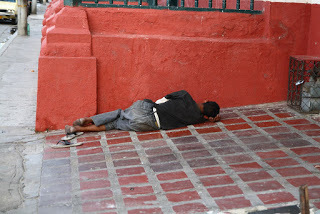
I can understand why people are afraid of Christ’s teaching, because it rips you away from all you’ve known, takes you away even from the security of family and friends and offers only the unseen and unproven community of humanity. But even the smallest taste of the reward of seeing Christ even in the eyes of the humblest among us will have you desiring more. And I understand the fear of believing in a sky god, so if that’s your hang-up, get rid of it for now. Embrace instead the idea of loving others as yourself, fearlessly. There is something to that notion that is real as gravity, though both are invisible forces. “Ah,” you say, “but science has proven gravity exists, it has not proven Christ’s message.” That may be true, but gravity did not require science’s blessing to exist, it had been doing its thing long before Sir Isaac Newton. It existed when man’s scientific understanding of the world they lived on could not fathom the Earth as a sphere but merely a flat plain. But the laws of gravity were obeyed despite the fact they were not understood, were intuited though not explored.
I invite you to investigate the radical notion of Christ’s teaching as a scientist would an unexplained natural phenomenon. With an open heart and an open mind. Not with a preconceived idea of what it is or is not, but with a curiosity for a force that has existed for millennia, an undeniable though as yet unexplainable something. I do not ask you to believe, in fact I think it is preferable that beliefs be left behind for this voyage. I ask only that you leave yourself open to the possibility of the experience, the seeing of the divine in even the least of your fellow human beings.
I could have done more, should probably always be doing more. Like I said before, I wasn’t anybody’s savior. But I do think perhaps we can all be each other’s saviors, each of us helping to save one another and humanity as a whole. And we can do so by always making the effort to see the humanity that exists in even the least of us.
Published on April 28, 2019 13:38



